Education
Inclusive education: Using assistive technologies to manage the learning needs of students with visual impairments at Makerere and Kyambogo Universities
Published
11 months agoon
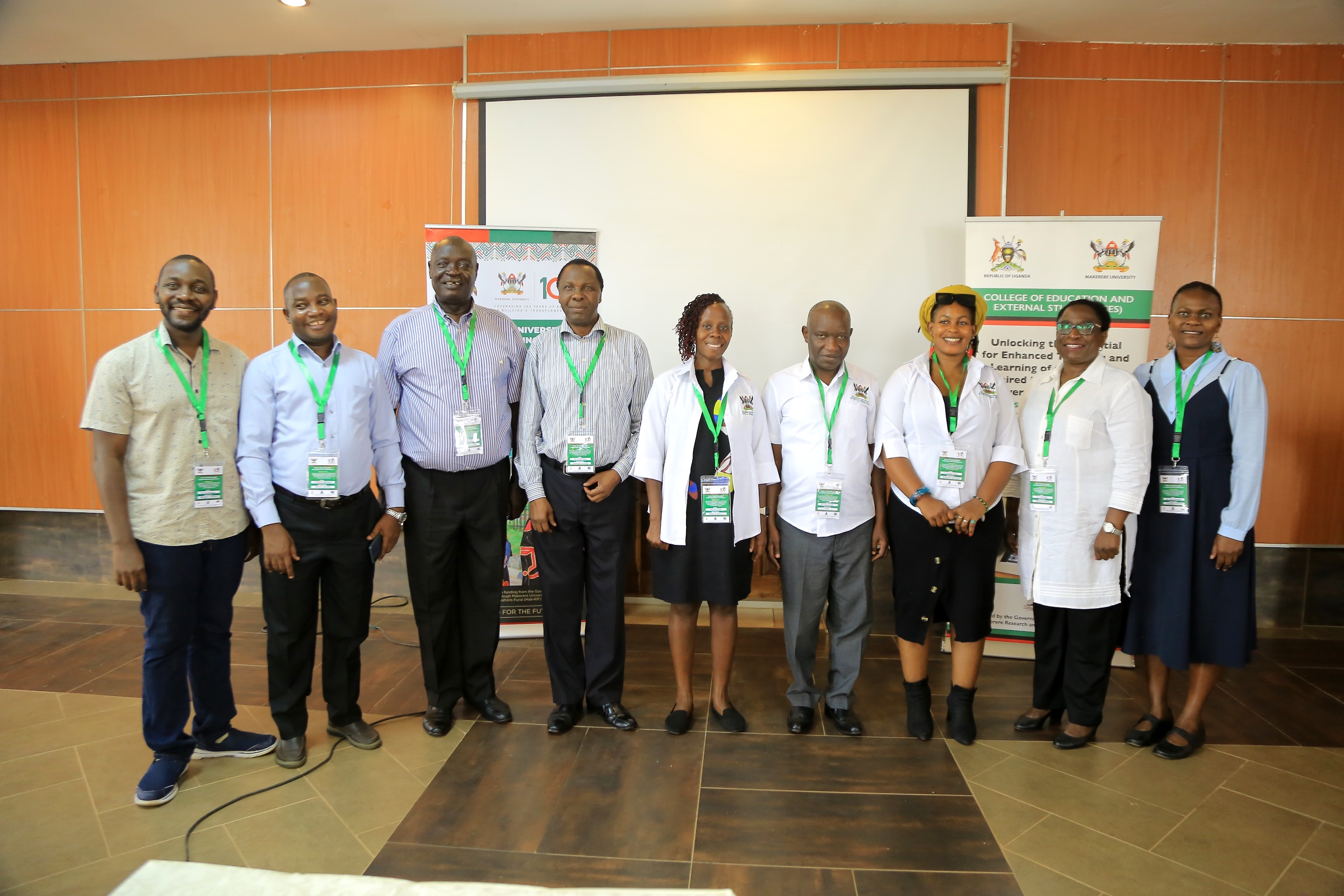
Over 80 academic staff at Makerere University and Kyambogo University have been trained under a five-year project designed to enhance the teaching and learning of visually impaired students in Uganda, through the use of assistive technologies. In addition, 100 university students with visual impairments have also been trained and supported. An online course titled, “Supporting Learning of Students with Visual Impairment” was developed. There is increased awareness and understanding at Universities of the needs of learners with visual impairments.
With this support, the College of Education and External Studies at Makerere University secured some specialized equipment and assistive technologies for research as well as facilitating usage and access to these devices by students with visual impairments.
Inclusive education is based on the premise that all children, regardless of their social, cultural, physical and mental (UNESCO, 2009) conditions should learn together (UNESCO, 2014). As a philosophy, inclusion urges training institutions to welcome, value everyone, and minimize barriers to accessing quality education and ensuring effective participation in learning experiences by all learners (Morina, 2017).
Globally, ICT is increasingly being used to improve the learning and independence of students with visual impairments (Gill, Sharma & Gupta 2017).
The project team consisting of staff from Makerere University College of Education and External Studies, Kyambogo University, National Council for Higher Education and Uganda National Association of the Blind noted that the preparedness of public universities in Uganda to provide education to students with visual impairments was still wanting. The research team noted that available studies indicated evidence of discrimination, an unsupportive teaching and learning environment, negative attitudes, inappropriate infrastructure and unprepared academic staff.
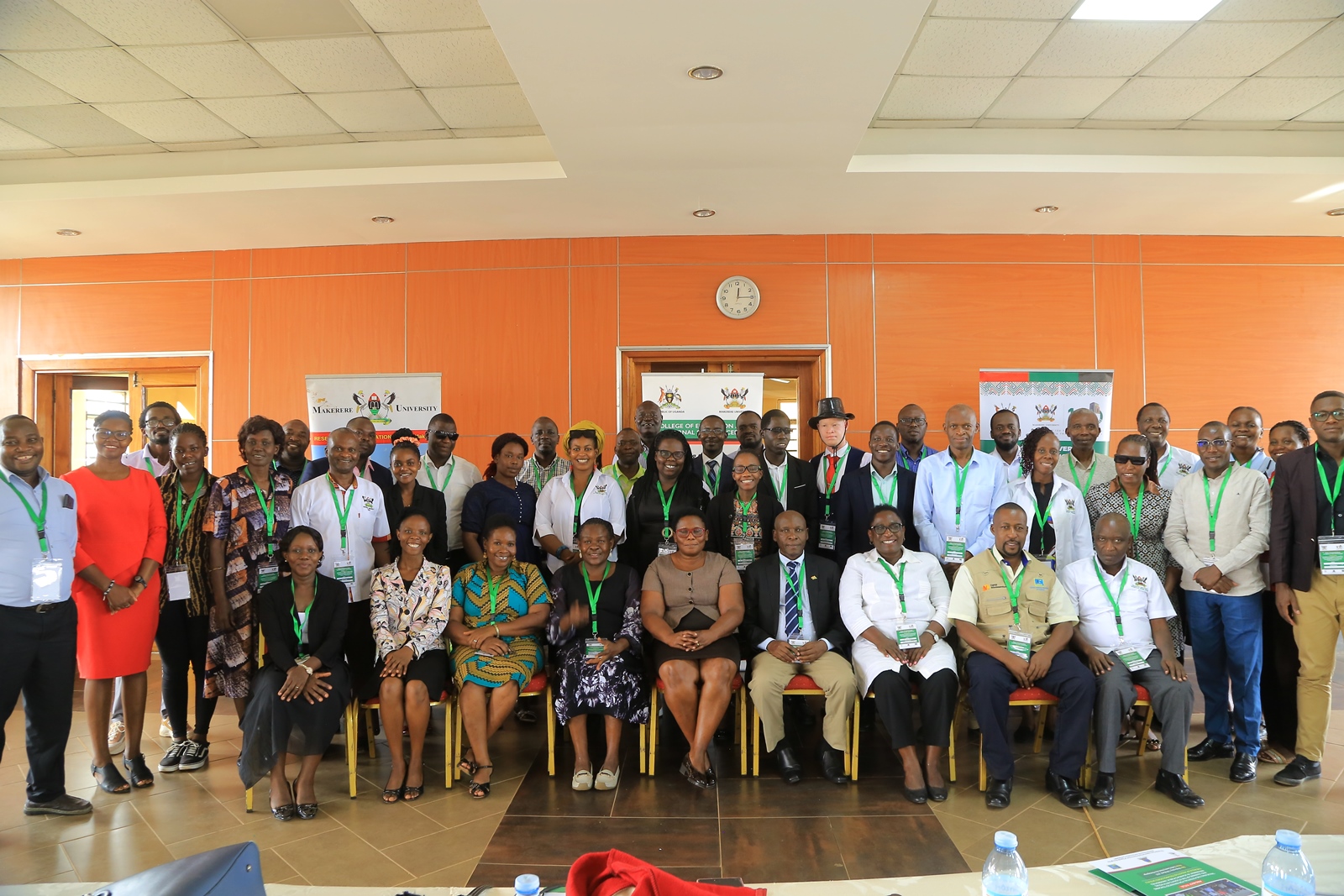
With funding from the Government of Uganda through Makerere University Research and Innovation Fund (MakRIF), a research project titled, Unlocking the Potential for Enhanced Teaching and Learning of the Visually Impaired in Uganda’s Public Universities: The Role of Assistive Technologies-(ATEVIL) was designed to address the challenge of limited awareness and capacity by public universities to support the teaching of students with visual impairments.
Since 2020, the research team has been implementing the ATEVIL project aimed at supporting students with visual impairment by strengthening educators’ capacities and enhancing educational accessibility.
At the stakeholder’s dissemination workshop held on 12th March 2025 to assess the five-year application of the ATEVIL project, the participants unanimously agreed that assistive technologies are key in helping the visually impaired students close the learning gaps.
The research team consists of the following members: Dr. Leah Sikoyo, Associate Professor Betty Ezati, Dr. Dianah Nampijja, Dr. Michael Walimbwa, Associate Professor Joyce Ayikoru, Mr. Daniel Okot, Dr. Godfrey Onyait and Mr. Ronald Luyima.
Dr. Leah Sikoyo, the Principal Investigator of ATEVIL Project
Presenting the situation analysis, Dr. Leah Sikoyo, the Principal Investigator-ATEVIL project indicated that the number of learners with visual impairments enrolling for university education has been increasing amidst limited capacity by teacher educators to effectively manage their learning needs.
Dr. Sikoyo attributed the rise in the number of students with visual impairments accessing university education to the awareness and sensitization efforts by the Government of Uganda, Ministry of Education and Sports, parents, the Uganda National Association of the Blind and other stakeholders.
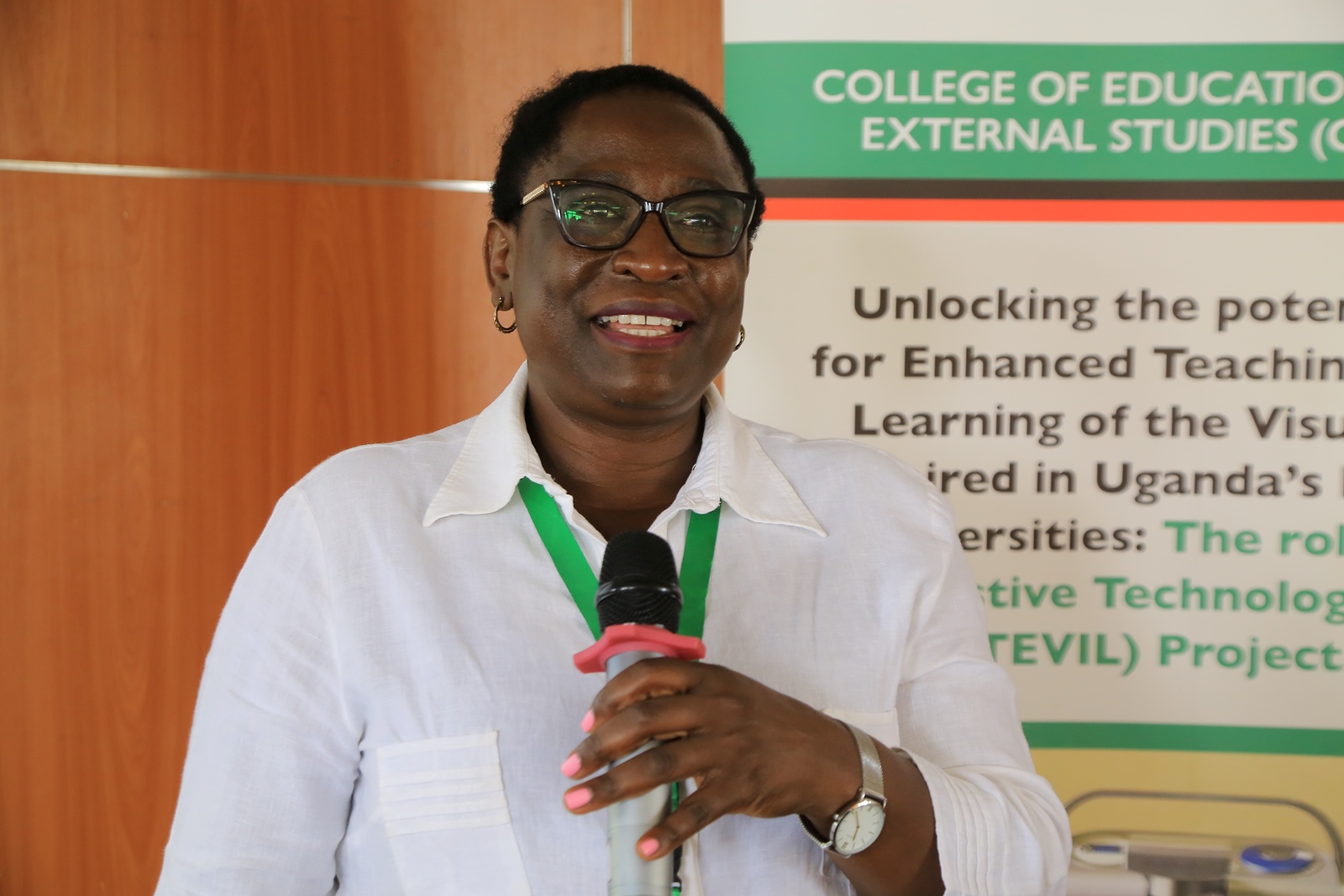
She disclosed that although at Makerere University, most of the students with visual impairments enroll for academic programmes in the humanities, social sciences, education, law and business, at the global level, where assistive technologies are accessible, they empower the learners with visual impairments to study a wide range of courses in the sciences, medicine, engineering and among others.
Using a very common scenario, Dr. Sikoyo who is an academic member of staff at Makerere University-College of Education and External Studies, mentioned a critical issue in the existing educational framework. She pointed out that most of the teaching staff unconsciously use this statement when teaching, and I quote: “Dear students, do you see this?” This inherent bias towards sighted students results in significant barriers for those with visual impairments. The lack of awareness and training among educators has led to inadequate support mechanisms, leaving students with visual impairments feeling isolated and ignored, especially during crucial assessment periods. She added that in some situations, academic staff would establish that some students have visual impairments during tests or towards the examinations period.
In response to these challenges, the ATEVIL project integrates assistive technologies to foster an inclusive learning environment. “Technology enables flexibility. It provides possibilities to adapt to the learning environment. Students can work not just with ease, but also with independence,” stated Dr. Sikoyo. She stressed that this approach not only empowers students to access information independently, but also shifts the educational paradigm towards a more equitable system.
The ATEVIL project’s innovative strategies encompass not just hardware and software, but also methodologies that cater to different learning needs, enabling educators to create a supportive environment for all students.
With the ATEVIL project success, its implications extend beyond the classroom, serving as a contact of hope for a more inclusive Uganda and fostering awareness and training among educators, the initiative hopes to maximize the potential of all students, regardless of their disabilities. It is hoped that, by addressing the systemic challenges faced by visually impaired students, this initiative is not just changing lives; it is redefining the future of education in Uganda.
Remarks by Representative of MakRIF
Representing Prof. Fred Masagazi Masaazi, the Chairperson of the MakRIF Grants Committee, Dr. Zahara Nampewo, the Deputy Principal, School of Law at Makerere University stated that true vision goes beyond physical sight, and this project aims at helping visually impaired students to see with their minds.
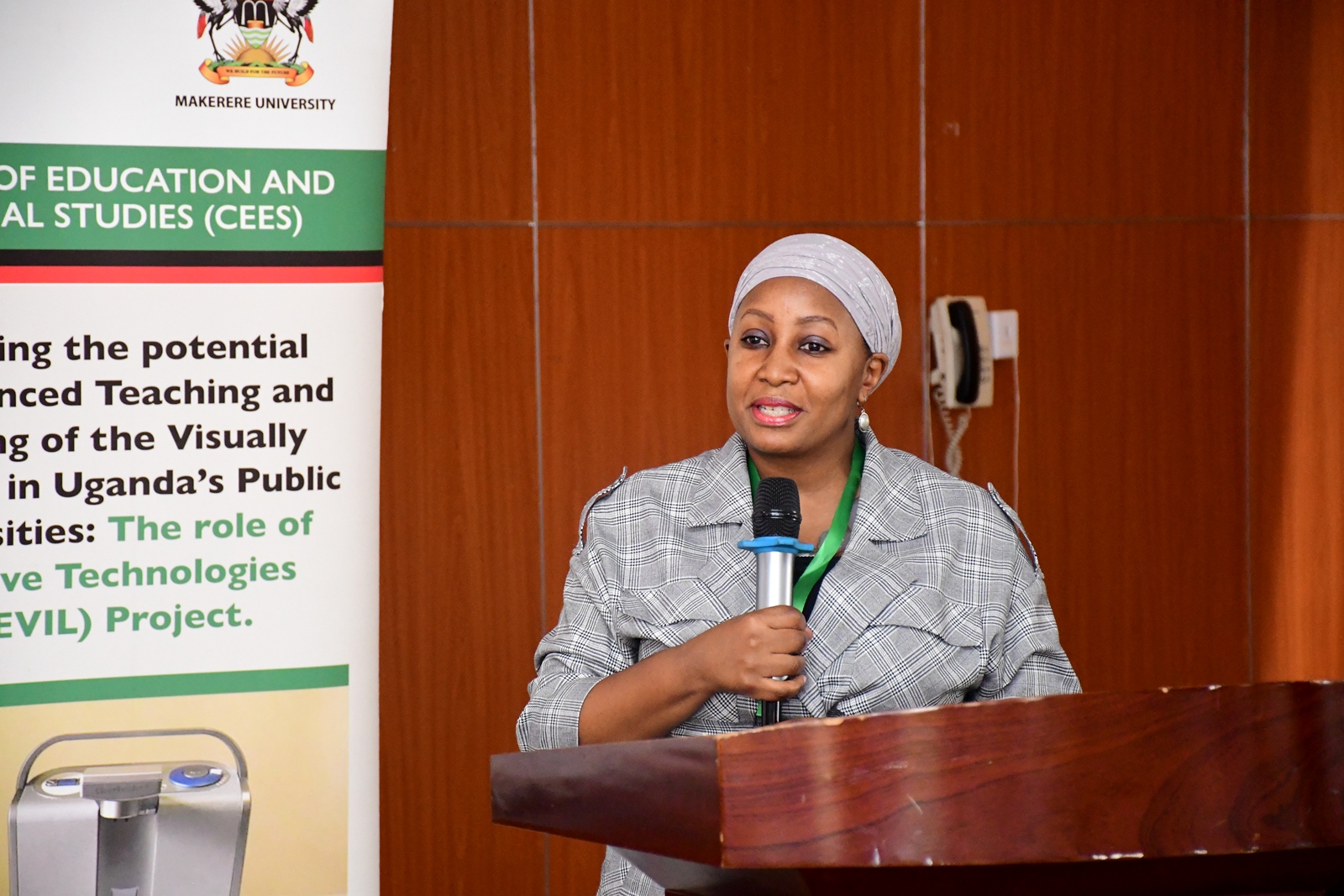
Dr. Nampewo commended the project team for their innovative approach towards inclusive learning for visually impaired students, noting that it has transformed the lives of learners and positively influenced government policy.
“In addition to learners with visual impairments, I implore the ATEVIL project team at Makerere University, Kyambogo University and National Council for Higher Education, to consider students with hearing and mental disabilities. I encourage you to expand the scope of this project to achieve even greater impact and actionable results,” said Dr. Nampewo, a Member of MakRIF Grants Management Committee.
Remarks from National Council for Higher Education
Participating in the stakeholder’s dissemination workshop, Dr. Olive Lunyolo, a Senior Education Officer at NCHE re-affirmed Government’s commitment to promoting inclusive learning across all educational institutions.
Dr. Dianah Nampijja presents impacts and outcomes
Dr. Nampijja said: “When we started this journey, it was a journey of not knowing things to do. As we have walked through, we have increased awareness on inclusive learning. We needed our students to be independent. We didn’t want to pity them. The goal is to equip the learners to thrive in competitive work environment.”
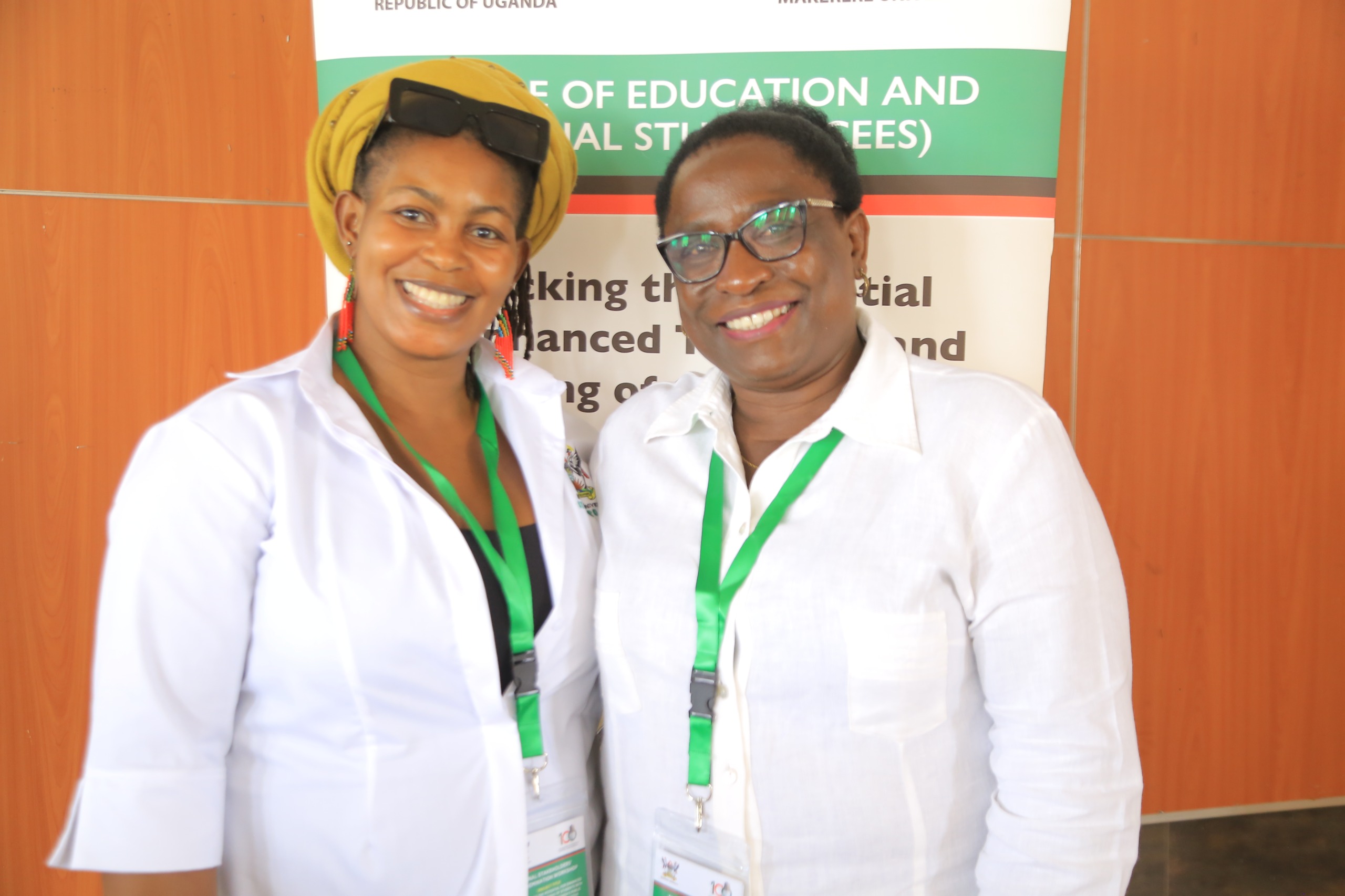
The ATEVIL project gathered insights into the lived experiences of students with visual impairments, ensuring that their needs were met comprehensively. According to Dr. Nampijja, the ATEVIL project presented possibilities. The project research implementation team focused on presenting possibilities to learners with visual impairments. “Assistive technologies are part of those artifacts that allow these possibilities,” she said.
She noted that by focusing on assistive technologies, the ATEVIL project made learning more accessible. “The initiative addressed gaps in the learning management systems, allowing students to navigate these platforms effectively,” she remarked.
Highlighting the importance of continuous professional development, Dr. Nampijja reported that through the ATEVIL project, 80 academic staff across Makerere and Kyambogo Universities were successfully trained in inclusive teaching strategies and assessment methods tailored for students with visual impairments.
Contribution from Makerere University Disability Support Unit
Ms Elizabeth Rwabu who manages the Makerere University Disability Support Unit mentioned that that she has been engaged with disability advocacy since childhood. “You should never allow the disability to define you. Accept your circumstances, but remember, you are not defined by them,” she advised. According to Ms Rwabu, this is a notion that the true challenges are not solely in the impairments themselves, but in the societal barriers that inhibit full participation in daily life. She noted that, ‘Barrier plus impairment equals disability.’ She explained that by dismantling barriers, be it physical, social, or systemic, individuals can reclaim their agency.
Contribution from the Makerere University Dean of Students’ Office
Mr. Peter Mwanja from the Office of the Dean of Students at Makerere University guided as follows: “In addition to providing accommodation to students with disabilities, we need to ensure that they are actively included in all aspects of university life. This includes sports and extracurricular activities, which are vital for social integration.”
Feedback from participants at the Stakeholders Dissemination Workshop
During the plenary session, participants observed that the disability will be broken when you remove the barriers preventing access to what you are meant to do. They commended the ATEVIL project which aims at addressing these barriers head-on for providing practical solutions that are changing perceptions and outcomes within the community.
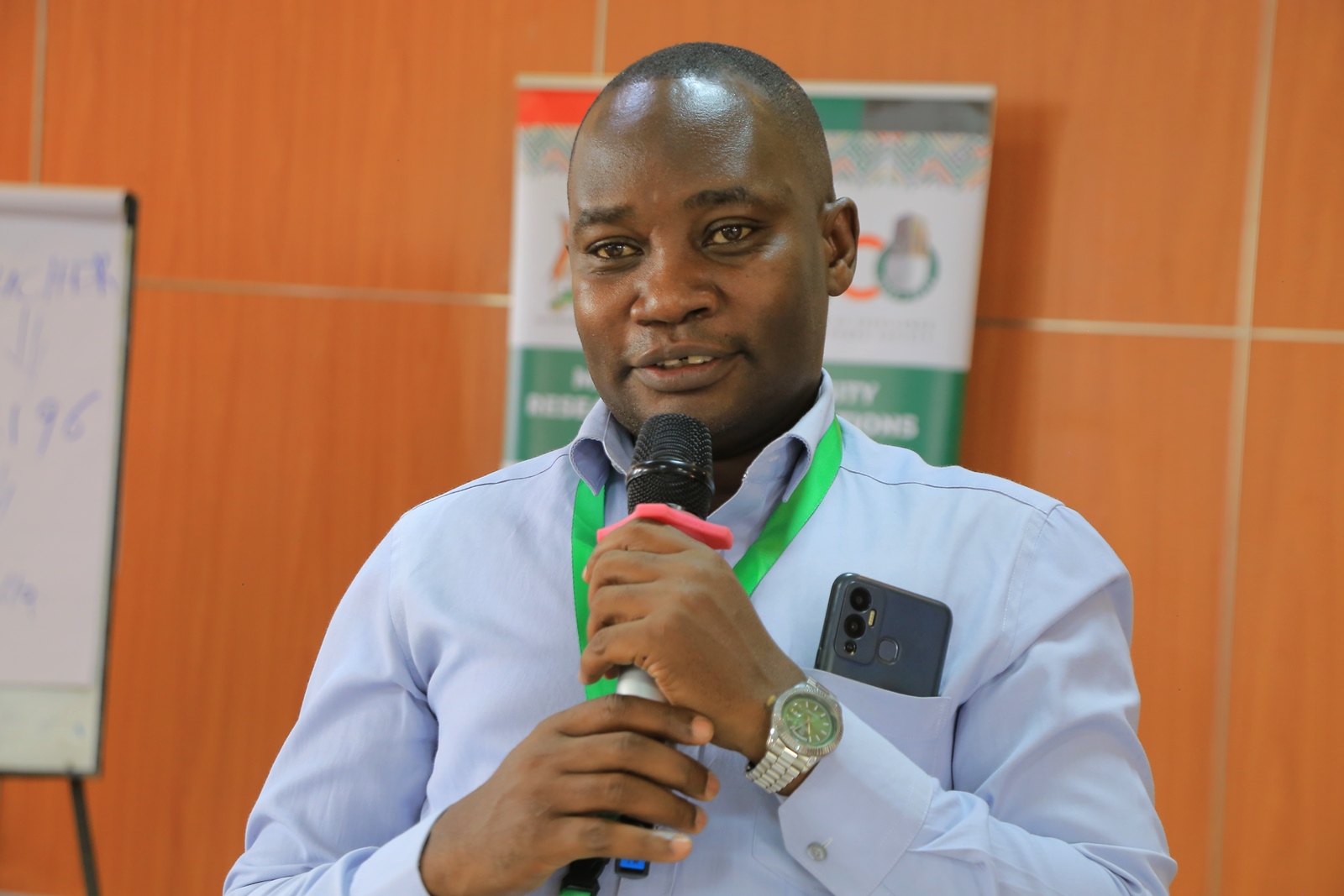
The participants underscored the need for teachers and staff to receive training on disability awareness and inclusivity. They also noted that while some progress has been made, many university facilities are still lacking essential features such as ramps and accessible restrooms.
The stakeholders advocated for policies that support and empower students with visual impairments as well as increased support from the Ministry of Education and Sports in form of funding specific to the needs of students with visual impairments, specialized equipment and assistive technologies.
Testimonies from academic staff trained during the ATEVIL project
Dr. Zaid Sekito, Makerere University
Dr. Zaid Sekito, an academic staff member at Makerere University College of Humanities and Social Sciences and a beneficiary under the ATEVIL Project, reflected on his transformative two-year journey since joining the initiative. “I have learned how to deal with students with visual impairments. I am very sensitive when it comes to inclusion of learners with different abilities as well as on the choice of words and terminologies,” he shared.
Convinced that true empowerment requires equitable educational opportunities, Dr. Sekito advocated for a shift towards “multi-diversity universities” that embrace modern technologies to support diverse learners.
He highlighted the need to create more ambassadors advocating for comprehensive training for staff to address the special needs of our students effectively.
Dr. Jackie Adong, Makerere University
Dr. Jackie Adong, an academic staff member at Makerere University College of Humanities and Social Sciences and a beneficiary of the ATEVIL Project shared her transformative journey in supporting students with visual impairments. She elaborated that being sensitive to the needs of students with visual impairments is a reminder of our responsibility as human beings to fellow human beings. Dr. Adong highlighted the rights of students with visual impairments, emphasizing their entitlement to education, participation, and access to resources.
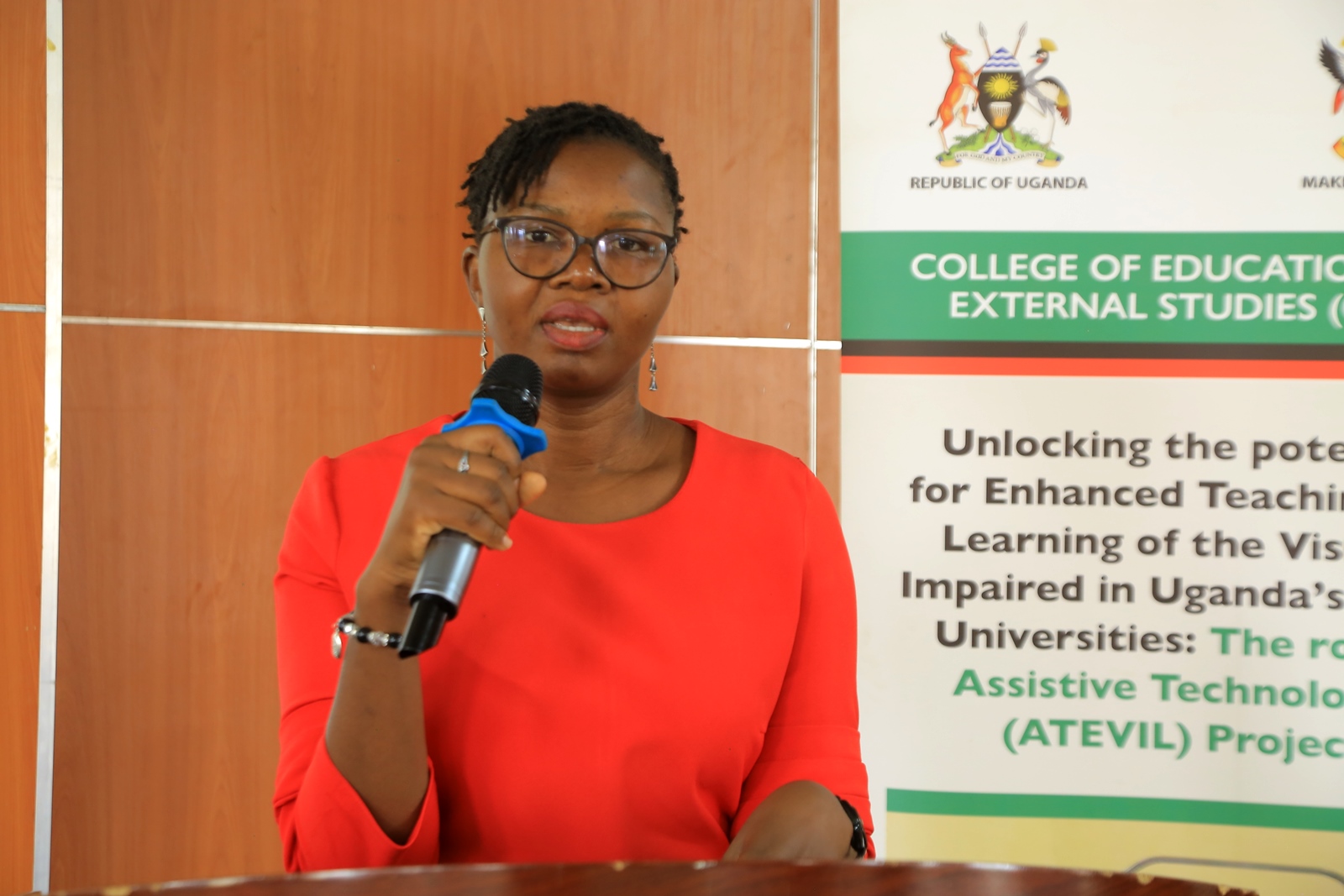
She has adapted to alternative teaching methods by posting class notes on WhatsApp and allowing students to utilize assistive technology for reading. “Now we are aware of them from the beginning of the class, during coursework and during exams,” she said, detailing how the Department of Literature at the College of Humanities and Social Sciences has created a supportive environment. Dr. Adong is committed to continuing these inclusive practices to ensure a brighter future for all students.
Dr. Asio Santamaria, Kyambogo University
Dr. Asio Santamaria, the head of the Department of Biological Sciences at Kyambogo University and a beneficiary of the ATEVIL Project, highlighted the significant impact of the initiative on her teaching approach and awareness of students with visual impairments.
Reflecting on her experience, she pointed out, “Observation has helped us recognize students who may appear physically fine, but require special attention.” Dr. Asio emphasized the need to accord extra time for coursework and exams to students with visual impairments. She credited the ATEVIL project for enhancing her knowledge of modern assistive technologies and inclusive teaching strategies.
Enock Kisekka, Kyambogo University
Enock Kiseka, an academic staff member at Kyambogo University and beneficiary of the ATEVIL Project, shared his transformative journey in supporting visually impaired students. He disclosed that initially, he did not understand fully the challenges faced by students with visual impairments.
His perspective changed after participating in inclusive training. Kiseka emphasized the importance of intentionality, stating, “I became more aware of students with low vision and learned to provide appropriate support, such as extra time during assessments.”
His engagement with the Disability Support Centre led to collaborative efforts to create a more inclusive environment. “We have developed a strong relationship with the special needs faculty,” he added, underscoring the collective responsibility in enhancing accessibility.
Students’ Testimonies
Awilo Mariam, a student at Makerere University and beneficiary under the ATEVIL Project, shared her experience, stating, “Before the training, I struggled with using the Moodle portal, but now I can type my notes and exams confidently.”
She emphasized the power of empathy, urging, “Treat everyone simply; life can change in an instant.” Awilo expressed gratitude for the support from her lecturers, acknowledging their crucial role in her educational journey.
Paul Kakooza, a student at Makerere University and beneficiary under the ATEVIL Project, expressed profound gratitude for the initiative’s impact on students with visual impairments. According to Kakooza, the ATEVIL project has yielded results, empowering visually impaired students to navigate technology and advocate for their needs.
Kakooza also reported on the transformation in his ability to access information. “We are now able to navigate our phones and the Internet, which was once a challenge for many of us,” he mentioned. He pointed out the societal discrimination faced by visually impaired individuals, urging for greater awareness among educators about their needs.
“We need to extend the ATEVIL project’s reach into the employment sector,” he urged, noting that many organizations underestimate the potential of visually impaired graduates.
Namugenyi Rosemary, an alumnus of Makerere University alumnus and beneficiary of the ATEVIL Project shared her experience. Being a visually impaired student, Namugenyi faced challenges coping with traditional learning methods. She was liberated and empowered by the ATEVIL project, which helped her to navigate technology effectively.
Namugenyi recounted how she initially struggled with online course works and assignments, but eventually mastered it. “Through the training, I became a pioneer in using scanning technologies to transform hard copy notes into accessible formats.
Namugenyi explained that her newly acquired skills through the ATEVIL project have enabled her to gain trust among her peers, who often seek her guidance for research. She concluded with heartfelt gratitude for the project, stating, “I pray that it continues to support others who may not yet have access to these vital resources.”
Daniel Elaju, a recent graduate of Makerere University and beneficiary of the ATEVIL Project, who graduated with a First Class degree shared how the initiative aided his academic success and workplace readiness. “I faced numerous challenges at the university, especially finding accessible materials, but the ATEVIL project helped bridge that gap,” he remarked.
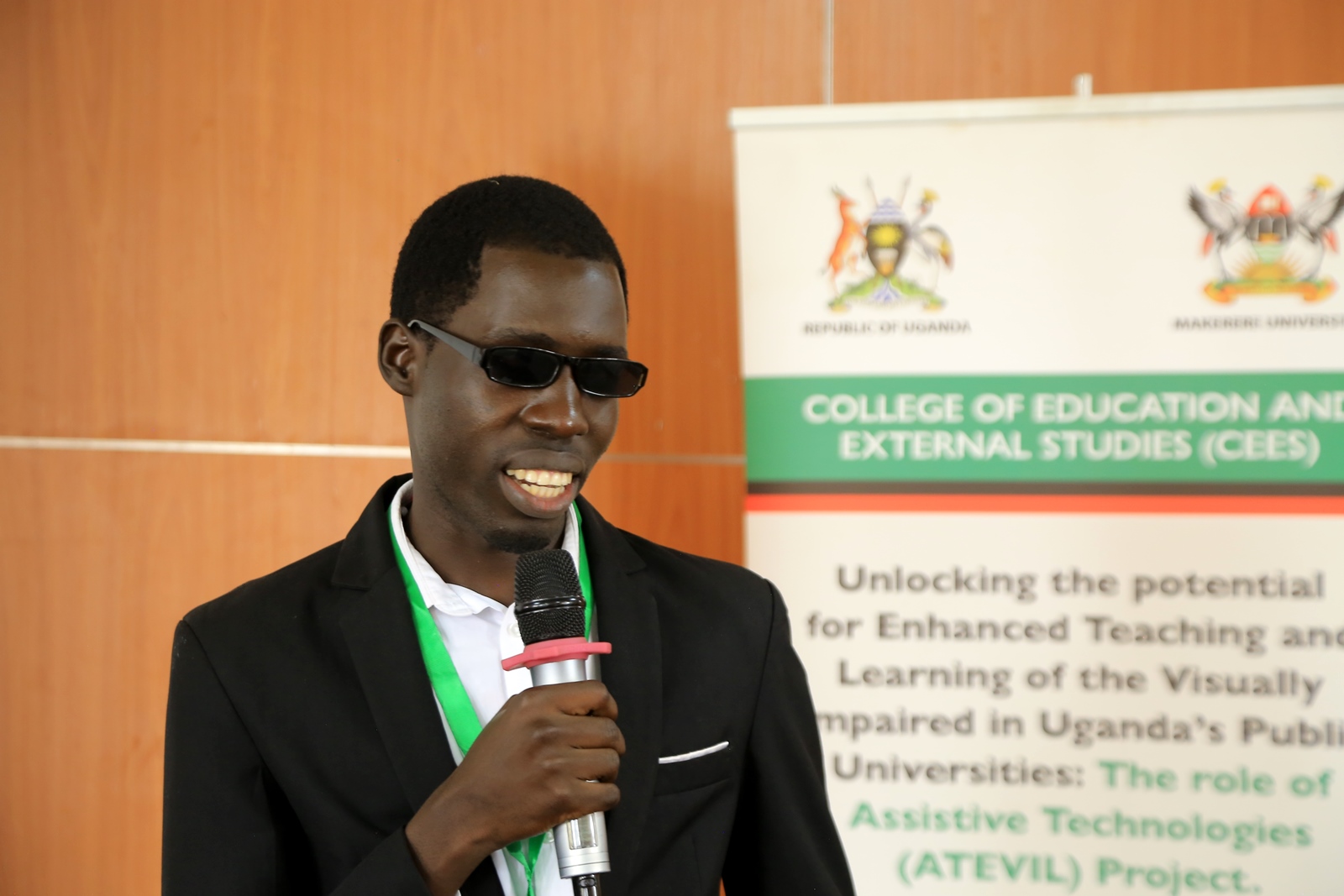
Elaju who works at Equity Bank said: “Using Jobs Access to With Speech (JAWS) Screen reader in computers which could enable the visually impaired students to use computers at ease, made a significant difference in his learning journey and career.”
He expressed gratitude for the training he received, which enabled him to outshine competitors during job interviews, notably at Equity Bank, where he secured a job. Elaju described his commitment to sharing knowledge with peers. “I mobilized my colleagues to ensure resources are accessible as well as helping them submit coursework.”
Noting that many employers were not aware of the capabilities of visually impaired individuals, Elaju urged the ATEVIL project and other stakeholders to continue with the advocacy and awareness at the different levels.
Trevor Twinomugisha Makuru, a second-year student at Kyambogo University and beneficiary of the ATEVIL Project, shared his impactful journey, emphasizing the project’s role in enhancing awareness among students with visual impairments. “Joining Kyambogo was challenging as a private student with low vision,” he noted, reflecting on the initial difficulties he faced.
He commended the ATEVIL project for providing him with the essential training in assistive technologies, which enabled him to become more independent in his studies. “We were inspired to revive the Kyambogo University Visually Impaired Students Association, where I currently serve as the President,” he stated, underlining their commitment to educating fellow students about these technologies.
Twinomugisha Makuru credited ATEVIL project’s influence towards his transformation. “Our trainings fostered a desire to advocate for inclusivity leading to workshops that educated others about visual impairments,” he reported.
He called for the expansion of such initiatives, advocating for inclusivity in spaces such as museums, where visually impaired students could also benefit from accessible learning experiences.
Latif Lugudo, an alumnus of Kyambogo University and beneficiary of the ATEVIL Project, shared his inspiring journey, emphasizing the project’s critical role in his academic and personal development.
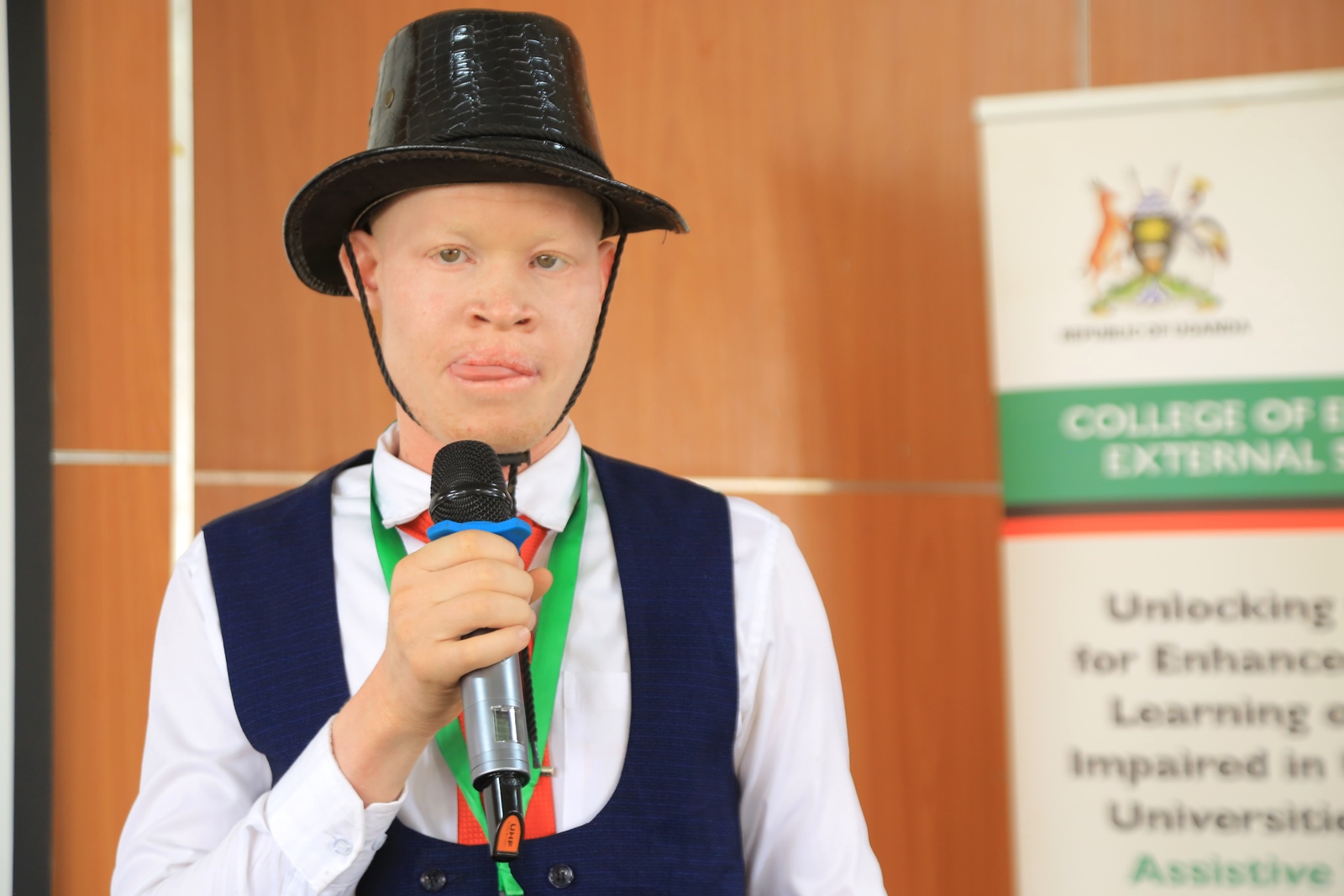
As a person with albinism and vision impairment, Lugudo who works as an Inclusion facilitator at Heifer International underscored the importance of self-acceptance, stating, “You have to accept the impairment you have before moving forward.”
He described the challenges he faced in his academic journey, particularly in a demanding business studies academic program. “At first, I experienced ridicule from classmates, which made adapting difficult,” he highlighted.
However, the trainings from the ATEVIL Project empowered him to engage more actively with faculty, leading to significant changes, including the installation of JAWS software on computers in the lab for visually impaired students.
Closing remarks by Prof. Betty Ezati
Wrapping up, the ATEVIL Project Stakeholders’ Dissemination Workshop, Dr. Betty Ezati, an Associate Professor at the College of Education and External Studies at Makerere University and a member of the research project team called upon stakeholders to strengthen collaboration to uplift learners with special needs in all educational settings.
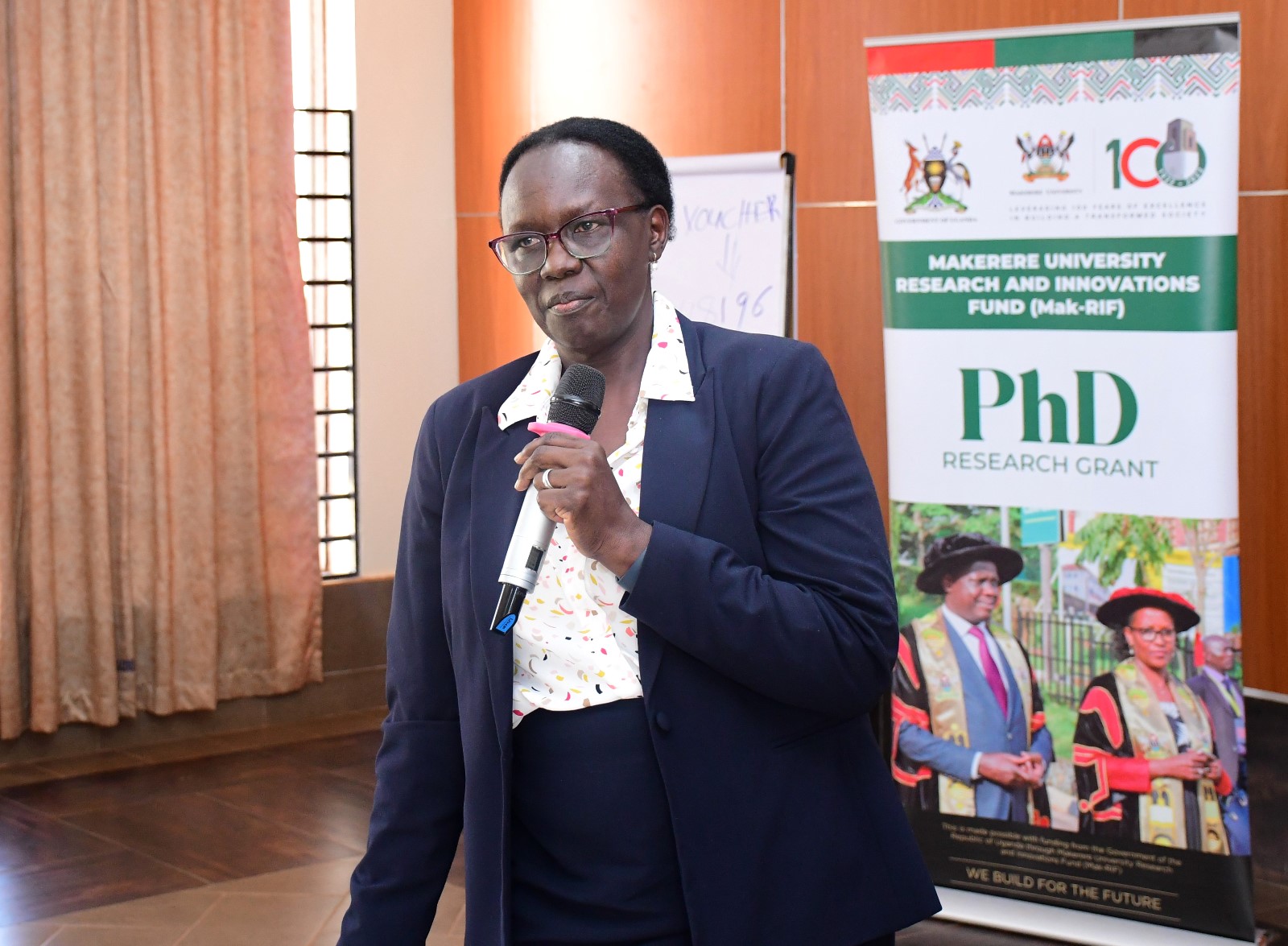
Prof. Ezati emphasized that supporting learners with visual impairments is a collective responsibility. “For a long time, we have left learners with visual impairments to fend for themselves, but now it’s clear that we all have a role to play in making a positive difference in the lives of these students. There is need for targeted support and provision of assistive technologies,” she stressed.
Acknowledging the various stakeholders who participated in the dissemination workshop, Prof. Ezati appealed for continued support and training. “This project is meant to light the fire; we hope it will remain burning,” she stated.
You may like
-


Meet Najjuka Whitney, The Girl Who Missed Law and Found Her Voice
-


Makerere University School of Public Health Graduates First Cohort of Cost-Effectiveness Analysis Short Course
-


Climate variability found to shape malaria trends in Yumbe District
-


Mak hosts First African Symposium on Natural Capital Accounting and Climate-Sensitive Macroeconomic Modelling
-


Uganda Martyrs Namugongo Students Turn Organic Waste into Soap in an Innovative School Project on Sustainable Waste Management
-


Strengthening Global Partnerships to Advance Research, Innovation, and Graduate Training: Makerere University Hosts Delegation from the University of Warwick
Education
Facilitating Access and Participation through Higher Education Access Programmes and Connected Education for Students with Refugee Backgrounds: A Global South Delphi Study
Published
2 months agoon
December 19, 2025
On 17th December 2025, a Delphi workshop was convened at Kampala Kolping Hotel, providing a collaborative platform for dialogue on standardisation and harmonisation of Higher Education Access Programmes (HEAP) across institutions, alongside strategies for portability and verification on demand through a HEAP Digital Passport. Discussions centered on accreditation, diversification of delivery and learner support, and future scenarios for HEAP and Connected Education.
Expert panelists underscored the urgent need for:
- Standardised HEAP frameworks across universities to ensure consistency in admission pathways.
- Harmonisation of HEAP curricula, duration, and procedures to eliminate barriers that hinder access and transition.
- Development of a HEAP Digital Passport enabling portability of credentials, secure digital verification, and integration with national qualification frameworks and international recognition systems.
Uganda, is one of the leading refugee-hosting countries with inclusive education policies, faces challenges in ensuring equitable access and participation for students with refugee backgrounds. While some universities offer HEAP as a bridging programme for marginalized learners, variations in programme design, delivery, and support systems still exist, which may lead to violations of accreditation. This calls for urgent standardisation and harmonisation to strengthen HEAP as a recognized transitional pathway into higher education.

Funded by Education Beyond Borders, researchers from Makerere University and the University of Edinburgh engaged stakeholders from public and private universities in Uganda through participatory workshops and expert meetings. This Delphi Workshop aimed providing a collaborative platform for dialogue on standardisation and harmonisation of Higher Education Access Programmes (HEAP) across institutions, alongside strategies for portability and verification on demand through a HEAP Digital Passport. Discussions centered on accreditation, diversification of delivery and learner support, and future scenarios for HEAP and Connected Education. The project is led by Dr. Rovincer Najjuma (Principal Investigator), with co-PIs Dr. Rebecca Nambi and Dr. Michael Gallagher.
Listening to experiences and co-creating solutions

Opening the workshop, Dr. Rebecca Nambi, a Senior Lecturer at Makerere University and Co-Investigator of the project, emphasized that the engagement was not about formal presentations, but about listening to experiences of students with refugee backgrounds that have accessed Higher Education using the HEAP programme and co-creating solutions with Expert Panelists.
Highlighting the persistent disparities in refugee participation in higher education, Dr. Nambi explained that while global and national efforts often focus on primary and secondary education, higher education remains critically under-supported. Drawing on years of research, she observed that refugee participation in higher education has historically stood at three percent (3%), later improving to about seven percent (7%), leaving the highest number of refugees excluded.
“Where do they go if they do not transition to higher education?” she asked. “Who supports them and how do institutions respond when learners arrive with disrupted educational trajectories?”
Shift from mere documentation of marginalization and adversity to practical interventions
Dr. Nambi underscored the importance of moving beyond research that merely documents marginalizationa and adversity. She advocated for practical interventions that improve systems for people with refugee backgrounds and strengthening education for host communities. “Addressing refugee education is part of a broader global agenda shaped by migration, conflict, and labour mobility in several countries.”
Dr. Nambi emphasized that HEAP provides a legitimate pathway for students with refugee backgrounds, and the ongoing adjustments aim to align the program with national standards and student needs.
Central to the discussion was the concept of connected learning, which promotes flexible, blended, and digitally supported education pathways that link learners across institutions, resources, locations, and systems.
Referencing the Makerere University E-Learning Environment (MUELE) as a key enabler of digital and interactive learning between lecturers and students at Makerere University, Dr. Nambi urged other universities to explore such a digital approach to catalyze the delivery of HEAP programmes. She noted that connected education is not solely about technology, but about harmonization, recognition, and collaboration among universities and regulators.
Comparing public and private universities, Dr. Nambi observed that private universities often have more flexible access pathways, and urged that documentation of students’ experiences of HEAP is critical to understanding gaps in provision, delivery and support
“Much of our work has involved examining how Makerere University and other universities are handling access for vulnerable students. We want to document lived experiences, analyze what is working and what is not, and generate evidence that can inform policy and institutional practice,” Dr. Nambi explained.
HEAP Emerging Challenges, lived experiences and future
Moderating one of the key sessions, Dr. Rovincer Najjuma, the Principal Investigator and a Lecturer in Digital Education and the Global South at the University of Edinburgh, guided participants through delphi workshop activities; these included engaging panelists in articulating expectations, uncertainities and risks, and developing future scenarios for HEAP accreditation, diversification of delivery and support and connected education.

Using participatory methods, participants shared insights through post-it notes and group reflections, capturing perspectives from expert panelists, HEI administrators, and students with refugee backgrounds. Dr. Najjuma encouraged an open dialogue, ensuring that student voices, particularly those with refugee backgrounds were centred in the conversation by encouraging them to share their experiences and journeys of participating in HEAP programmes.
The panelists acknowledged that while the HEAC has changed the nomenclature from HEAC to HEAP, programmatic provisions need to evolve, to address the inconsistencies that remain with respect to how institutions implement HEAP, duration, curriculum, and transfer of HEAP credit across institutions. Panelists shared about the critical gaps in awareness, mentorship, orientation, and institutional readiness to implement HEAP in ways that support refugee learners effectively.

On the issues faced by students with refugee status, participants identified several recurring challenges affecting access to and participation in higher education. These included low awareness of the HEAP programmes, fragmented and uncoordinated information dissemination, and difficulties in credential recognition and transfer across institutions and country host-country education systems.
Students highlighted low self-esteem, identity struggles, and stigma, especially where access programmes are perceived as inferior to Advanced High School Certificates. They also cited financial barriers, limited digital access, mental health challenges, and lack of learner-centred teaching approaches.
Key outcomes from the workshop
Panelists outlined key expectations to strengthen access and participation, which included the development of a standardized national HEAP curriculum, with clear and uniform entry requirements, and seamless credit transfer across institutions and host countries, facilitated by the development of HEAP Digital Passport.
Mentorship emerged as a cornerstone of learner support, alongside extended orientation programmes, life skills training, and entrepreneurial education. Participants emphasized the need for blended and online learning, supported by affordable internet access and institutional investment in digital infrastructure.
Policy coherence, stakeholder engagement in policy formulation, and timely communication of reforms were identified as essential for successful implementation. Participants called for gender-sensitive curricula, student representation structures, humane and trauma-informed teaching staff, and adequate learning resources, including reference materials.
HEAP: A Structured Pathway to Higher Education
Dr. Gidraf Joseph Wanjala, Principal of the College of Education, Open and Distance Learning at Kampala International University, highlighted the evolution of access programs in Uganda.
“Historically, the higher education access framework was known as the Higher Education Access Certificate (HEAC). Last year, it was updated to the Higher Education Access Program (HEAP), reflecting a shift from a certificate to a full program, approved by the Ministry of Education and Sports,” Dr. Wanjala said.

He explained that HEAP provides structured pathways for students to progress from diploma to bachelor degree levels, from mature entry to degree programs, and from senior secondary school to higher education. “This program is inclusive of refugee students and all marginalized groups, provided there is funding and space. HEAP supports students not just academically, but also through orientation programs, mental health training, reproductive health education, and gender-responsive support,” Dr Wanjala stated.
Challenging Misconceptions

Dr. Derrick Ssekajugo, Chair of the Special Purpose Committee on Academics and Acting Principal of the College of Economics and Management at Kampala International University, addressed public misconceptions about HEAP.
“Some perceive HEAP—or previously HEAC—as only for students who could not succeed in secondary school. That is not the case. For instance, we have students who initially studied Education but through HEAP transitioned into medicine. Today, they are fully qualified professionals,” Dr. Ssekajugo said.
He also highlighted the pedagogical shift from teacher-centred to learner-centred approaches in secondary education and the need for universities to adapt. “Students entering HEAP come with diverse learning experiences, and universities must adjust to integrate them effectively into competency-based programs,” he noted.
Dr. Ssekajugo added that benchmarking with both local and international institutions is critical to identify gaps and best practices, which inform ongoing program improvements and policy reforms.
HEAP and standardization, accessibility and inclusivity
Sharing their vision for HEAP, panelists recommended standardization, accessibility, inclusivity and foundational nature of HEAP. They advocated for a competence-based HEAP, with a standardized curriculum, offline and online access to resource books and materials, diversification of delivery and support through blended learning and a HEAP Digital Passport for portability and verification on demand.
Education
Real life project: Makerere University Vice Chancellor hands over constructed Wall Fence to Makerere College School
Published
3 months agoon
November 13, 2025
By Ritah Namisango and Harriet Musinguzi
On 12th November 2025, Makerere University officially handed over a newly constructed wall fence to Makerere College School. The real-life project was executed by technical students pursuing higher diploma courses in Civil Engineering and Architecture under the Uganda Vocational and Technical Assessment Board (UVTAB). The students are enrolled at the Centre for Lifelong Learning and Teaching, which operates within the College of Education and External Studies (CEES) at Makerere University.
The Centre for Lifelong Learning, in partnership with UVTAB, is involved in implementing real life projects within the communities-a practical approach that ensures that students identify problems within the community, hold collaborative discussions, and come up with projects to solve the problems.
The handover ceremony of the newly constructed Wall Fence was witnessed by key stakeholders that included officials from UVTAB, the College of Education and External Studies (CEES), the College of Engineering, Design, Art and Technology (CEDAT), the leadership of Makerere College School, UVTAB Deputy Executive Secretary and the technical students pursuing the higher diploma in Architecture and Civil Engineering.

The Vice Chancellor of Makerere University, Prof. Barnabas Nawangwe, represented by the Principal of the College of Education and External Studies, Prof. Anthony M. Mugagga, expressed heartfelt gratitude to Dr. Martin Muyingo, Head Teacher of Makerere College School, for providing a valuable learning space to students under the lifelong learning and teaching program. He acknowledged Prof. Dorothy Okello-Chairperson of the Uganda Vocational and Technical Assessment Board (UVTAB), Prof. Moses Musinguzi-Principal of CEDAT, course instructors, and students for their commendable contributions. He noted that the newly constructed wall stands as a testament to the power of lifelong learning and practical teaching.
The Vice Chancellor commended the management and staff of the College of Education and External Studies (CEES) for implementing programmes through the Centre of Lifelong learning, which are aligned to the Makerere University’s Strategic Plan. He observed that the partnership with UVTAB increases the number of students accessing quality education services, enhances lifelong learning, promotes practical education, and contributes to community transformation.

Congratulating the technical students upon this milestone, and in solidarity, the Vice Chancellor wrote: “I am an architect and courses in my profession go deep to my heart. Congratulations to the students, the engineers, and course instructors.”
Prof. Nawangwe emphasized the importance of architecture-related courses and praised Makerere’s longstanding commitment to student-centered learning, innovation, and thought leadership principles that have guided the university for over two decades. He highlighted that Makerere’s strategic direction aligns with Uganda’s National Development Plan IV and Vision 2040, which advocates for inclusive, equitable, and lifelong education. This vision, he said, reflects the aspirations of His Excellency President Yoweri Kaguta Museveni and the Government of Uganda’s education agenda.
He explained that the Centre for Lifelong Learning (CLL) at CEES, serves as a bridge between the university and the community. It offers opportunities to Ugandan youth and individuals who lack the financial means or academic qualifications to access Makerere’s mainstream programs, to join UVTAB technical education programmes, with instructors at Makerere University Centre for Lifelong Learning. Students enrolled in the program typically come from A-level backgrounds or hold certificates from technical institutions.

He highlighted that long before the Government of Uganda, through the Ministry of Education and Sports, restructured the secondary school curriculum to embrace competence-based teaching and learning, Makerere University had already been championing student-centered education. For over two decades, the university has promoted innovation, experiential learning, and thought leadership.

Ms. Jalia Nassaza, the Acting Deputy Executive Secretary of the Uganda Vocational and Technical Assessment Board (UVTAB), emphasized the importance of real-life projects within the Technical and Vocational Education and Training (TVET) curriculum. She explained that these projects enable students to identify community challenges, engage in collaborative discussions, and develop practical solutions ultimately shaping them into holistic professionals. Through this approach, learners gain essential skills in planning, teamwork, and applying theoretical knowledge to real-world scenarios. Ms. Nassaza emphasized the need for an education system in Uganda that equips students to solve local problems and improve their surroundings. “We want to make our education realistic by translating knowledge into solving problems,” she affirmed.

The Principal of the College of Engineering, Design, Art and Technology, Prof. Moses Musinguzi while congratulating the students upon the completed wall fence structure and other projects, noted that as professionals, scientists get a lot of public criticism because they are the core of providing solutions to societal problems. He said the commissioning of the fence was testimony that the university in partnership with UVTAB, was teaching students ways of solving problems around them. He said that as a college, CEDAT provides access to the required infrastructure in the labs, workshops, and studios, as well as technicians who support the teaching.
Prof. Musinguzi said Makerere University was considering a revision of the assessment, making continuous assessment total to 60%, while classwork is rated at 40%. He also mentioned the CEDAT model, whereby the university was considering utilizing students in technical subjects to support the Estates and Works Department in infrastructural maintenance and service works instead of hiring externally, and that students on both Diploma and Degree programs would be engaged. ‘We need to see scientists directly engaged in the development of the country,’ he emphasized.

Speaking on behalf of the instructors, Mr. Barnabas Mabonga highlighted some of the students’ requirements that included the need for basic tools, providing opportunities for their academic progression to degree programs, and strengthening the safety measures. Some of the actual projects that the AVTAB technical students under CEES and CEDAT have worked on at Makerere College School include: a yard constructed at the boys’ hostel, the wall fence, and a drainage system. He said 173 students out of whom 28 are girls, were enrolled in the Civil Engineering and Architecture higher diploma program. He informed the Vice Chancellor and other guests present that the students in the real-life learning and teaching programs were excelling in performance, with a pass rate of 99%.

Dr. Oscar Mugula, Coordinator of the Centre for Lifelong Learning, emphasized the value of community engagement in their academic programs. He noted that the partnership with Makerere College School began two years ago, when students from the center undertook repair works on the school’s infrastructure. The collaboration has proven mutually beneficial, with the beneficiary school experiencing reduced development costs, while students, particularly those studying technical drawing, gained hands-on experience through the perimeter wall project, which contributed to their coursework and project assessments for the year.
In partnership with UVTAB, the Centre for Lifelong Learning offers diploma courses in Civil Engineering, Architecture, and Electrical Engineering. The students pursuing these courses are examined and accredited by UVTAB. Students benefit from experiential learning at CEDAT, where they are encouraged to innovate using affordable, locally sourced materials. They are also placed in real-world workstations and garages to observe best practices and avoid unethical conduct. Graduates of the program either join the workforce or continue their academic journey at the university.

The Center for Lifelong Learning at CEES is charged with the duty to take the university to the community, providing opportunities to Uganda’s youth and persons interested in technical education, who may not have the requisite funds or grades to join the university’s degree programmes. The students on the program are either directly from A-level or other technical institutions.
Education
Digital Education: CEES holds stakeholders’ workshop to inform curricula for Postgraduate Diploma in Education (Online Track)
Published
4 months agoon
November 7, 2025
November, 4th 2025: Makerere University through the College of Education and External Studies, has been offering the Postgraduate Diploma in Education (PGDE) following the face-to-face delivery model.
In addition, to the physically taught Postgraduate Diploma in Education, the College of Education and External Studies, embarked on a process of curriculum development, for the online delivery model (PGDE-online).
This strategic option presents learners with a choice to either enroll for the physically taught (face to face) or the online Postgraduate Diploma in Education.
The introduction of the online mode of delivery for the Postgraduate Diploma in Education was informed by wide consultations, which revealed that many working adults including teachers, and distant learners, who wished to study the programme, were unable to attend. Engagements with such prospective applicants, called for the online delivery option.
To address this challenge, in March 2024, the College of Education and External Studies, embarked on developing the curriculum for the online option. The PGDE (online track) will be delivered on the Makerere University eLearning Environment (MUELE).
According to staff at the College of Education and External Studies, the online delivery model will enable learners to study remotely while acquiring modern pedagogical and digital skills essential for the 21st century education.
College hosts Stakeholders’ workshop to enrich curricula for the online delivery option:
On 4th November 2025, the College of Education and External Studies hosted a stakeholders’ workshop to enrich the curriculum document.
The workshop brought on board various stakeholders, including representatives from the Ministry of Education and Sports (MoES), the National Curriculum Development Centre (NCDC), the Department of the Academic Registrar, Directorate of Graduate Training, former students of the College who studied the Postgraduate Diploma in Education (face-to-face), staff from other units within Makerere University, and representatives from other education institutions including Ndejje University, Uganda Christian University-Mukono, and Uganda Martyrs’ University-Nkozi.
Remarks by the Head of Department:
Welcoming the participants, Dr. Genza Gyaviira Musoke, the Head of the Department of Foundations and Curriculum Studies thanked the stakeholders for accepting to dedicate time, to participate in the workshop. He called upon the stakeholders to suggest strategies aimed at ensuring that the PGDE delivered though the face-to-face model blends and complements the proposed online track.
College Principal emphasizes digital pedagogies:

The Principal, notified the stakeholders, that the College of Education and External Studies through the Institute of Open, Distance and e-Learning (IODeL), is credited for the operationalization of the Makerere University e-Learning platform (MUELE), which enabled online teaching and learning during the CoVID-19 pandemic.
Impressed by this milestone, the Vice Chancellor-Professor Barnabas Nawangwe, tasked the College of Education and External Studies, to come up with innovative teaching and learning pedagogies.
On this note, Professor Mugagga applauded the Department of Foundation and Curriculum Studies and the School of Education, for responding to the call from the Vice Chancellor, which has led to the development of the curriculum for the online delivery of the Postgraduate Diploma in Education (PGDE-online).
Emphasizing the trends in the education sector, he highlighted the technological demands presented by the Competence based curriculum (CBC), the National Teacher Policy of 2019, the Ministry of Education and Sports requirements for all teachers to be degree holders, and the need to embrace artificial intelligence (AI). He stressed that these reforms require teachers who are grounded in digital/online pedagogies, to nurture, teach and mentor, the next generation of students and teachers.
Presentation from the Director of Open, Distance and e-Learning:

Professor Paul Birevu Muyinda, underscored that the development of the online delivery of programs fits within the digital strategy for Uganda, launched by the Ministry of Education and Sports (MoES) in August 2024.
In line with the Ministry’s vision of increasing access to education, through the online delivery of the Postgraduate Diploma in Education, Makerere University is extending access to quality education services.
Professor Muyinda noted that the online delivery option, is aligned to the digital transformation agenda of the University, which is stipulated in the University’s Strategic Plan.
He acknowledged the Chairperson of the Committee, Dr. Harriet Najjemba, and her team for the valuable work, which has led to the draft curriculum, that the stakeholders had convened to discuss.
Opening the Stakeholders’ Workshop:

The Deputy Vice Chancellor (Academic Affairs), Professor Sarah Ssali, represented by Dr. Julius Kikooma, the Director of Graduate Training, commended the College of Education and External Studies, for the timely intervention, that will enable students to access quality education online. Noting that the evolution of academic programmes is within her mandate, Professor Ssali thanked the College for bringing on board various stakeholders, to provide valuable ideas.
Presentation of the proposed curriculum for the PGDE (online):

Presenting the proposed curriculum, Dr. Alfred Buluma from the School of Education highlighted the comprehensive design, online teaching and learning infrastructure for programme delivery, programme objectives and outcomes, core course units and electives, employment prospects, as well as, the availability of competent and technologically grounded staff to deliver the programme.
Dr. Buluma explained that the Postgraduate Diploma in Education (online) shall be a blended programme, heavily online, and with limited face-to-face interactions. He emphasized that Makerere University possesses adequate resources and infrastructure to support the program.
He acknowledged the involvement of staff from multiple departments: Humanities and Higher Education, Science and Technical Education, and Foundations and Curriculum Studies, alongside e-learning support staff.
Input from internal stakeholders:
Principal of the College:
Professor Anthony Muwagga Mugagga submitted that the proposed curriculum should embrace the ethical use of artificial intelligence (AI) in teaching and learning. He urged the participants to critically think about the delivery of experiments and practical classes online.
Reflecting on the remote areas in Uganda, where citizens do not have access to electricity and Internet, Professor Mugagga challenged the stakeholders, to bear in mind, the issue of inclusive education, and the possibility of delivery of online education, to teachers and students in such areas.
Directorate of Graduate Training:
Associate Professor Julius Kikooma, guided that the programme should strengthen the research capabilities of students/learners. He explained that the programme should provide a linkage to the research priorities stated in the Makerere University research agenda, as well as, the National Development Plan (NDPIV). As the team designs the curriculum, he encouraged them to study the University Senate guidelines document. He advised the team to include the knowledge areas, and learning outcomes. Citing the Graduate Students Handbook, Associate Professor Kikooma stressed the section on quality assurance that highlights the following competence areas: disciplinary knowledge, transferable skills, professional, and research competences.
Department of the Academic Registrar:

Stating its responsibility, the Senior Assistant Academic Registrar-Ms. Enid Kemari, who represented the Academic Registrar-Professor Buyinza Mukadasi, explained that the Department ensures that the proposed curriculum meets the standards set by the University and the National Council for Higher Education.
She referenced the Makerere University Policy on Open, Distance, and E-Learning, highlighting its main objective of increasing access to higher education through flexible learning modes. Ms. emphasized several key policy areas critical to the new online teacher education programme.
She commended the School of Education for aligning its program with national and institutional policies, noting that it will enable teachers, especially those already employed, to upgrade their qualifications without leaving their jobs. “It will contribute significantly to improving education quality in Uganda,” she said.
Plenary Session involving external stakeholders:

The plenary session provided the following recommendations.
- The online delivery should encompass the 21st century education expectations and demands of a learner and teacher.
- In addition, to increasing access to quality education, the curriculum document under the section “justification of the programme” should state the new areas in the education field, and the changed context under which teachers are operating.
- It should emphasize using the Makerere University e-Learning Environment (MUELE) in both teaching and learning.
- The curriculum should focus on developing the skills of learners (not only as those being taught), but also being empowered as learners to teach using the online delivery.
- There is need for retooling courses for both the teachers and learners as well as engagements on using artificial intelligence (AI) ethically.
Way forward:
Dr. Genza Gyaviira Musoke, highlighted that the input from stakeholders would be incorporated into the proposed curriculum. He briefed the participants that the proposed curriculum would be presented to the School of Education Academic Board, the College of Education and External Studies Academic Board, the University Senate and Council, and to the National Council for Higher Education.
Trending
-

 General2 weeks ago
General2 weeks agoAptitude Exam (Paper 1) Results for the Mature Age Entry Scheme 2026/2027
-

 Health5 days ago
Health5 days agoUganda has until 2030 to end Open Defecation as Ntaro’s PhD Examines Kabale’s Progress
-

 General6 days ago
General6 days agoMastercard Foundation Scholars embrace and honour their rich cultural diversity
-

 General2 weeks ago
General2 weeks agoFor Youth by Youth – Call for Second Cohort Applications
-

 Agriculture & Environment4 days ago
Agriculture & Environment4 days agoUganda Martyrs Namugongo Students Turn Organic Waste into Soap in an Innovative School Project on Sustainable Waste Management
